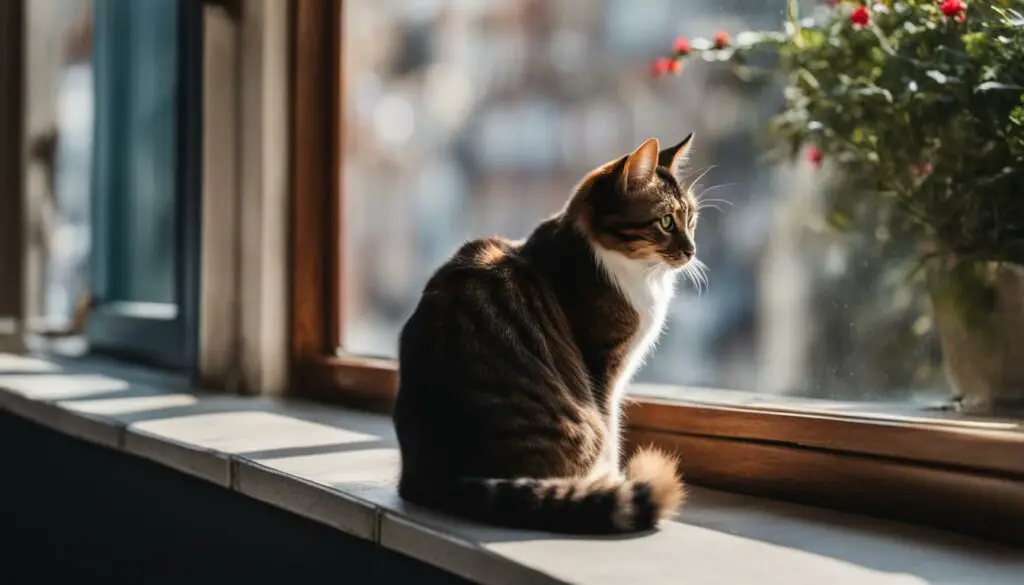Cats are known for their mysterious behaviors, and it can be disheartening when your own cat seems to prefer the company of others. While every cat is unique, there are several potential reasons why your cat may not show the same affection towards you. Understanding feline behavior patterns and the cat-human bond can shed light on this furry dilemma.
Key Takeaways:
- Each cat has its own unique personality and preferences, which can influence their interactions with humans.
- Early experiences and socialization play a significant role in a cat’s behavior towards their owner.
- Positive reinforcement is crucial in building a strong bond with your cat.
- Environmental factors can impact a cat’s comfort level and their feelings towards their owner.
- Building trust and patience is key to deepening your bond with your cat.
The Unique Personality of Cats
Cats have a reputation for being independent and aloof compared to their canine counterparts. They have their own unique personalities and preferences, which can greatly influence their interactions with humans. Some cats may naturally be more reserved or selective in their affections, which may contribute to them seeming to prefer other people over their owners.
Understanding the feline behavior patterns can help shed light on why your cat may not show the same affection towards you. Cats are highly intuitive creatures and are sensitive to their environment and the people around them. They may gravitate towards individuals who provide them with a sense of security and comfort.
It’s important to remember that not all cats are the same and that their preferences may change over time. Just like humans, cats can also have their moods, preferences, and individual quirks. Building a strong bond with your cat takes patience, understanding, and a willingness to adapt to their unique personality.
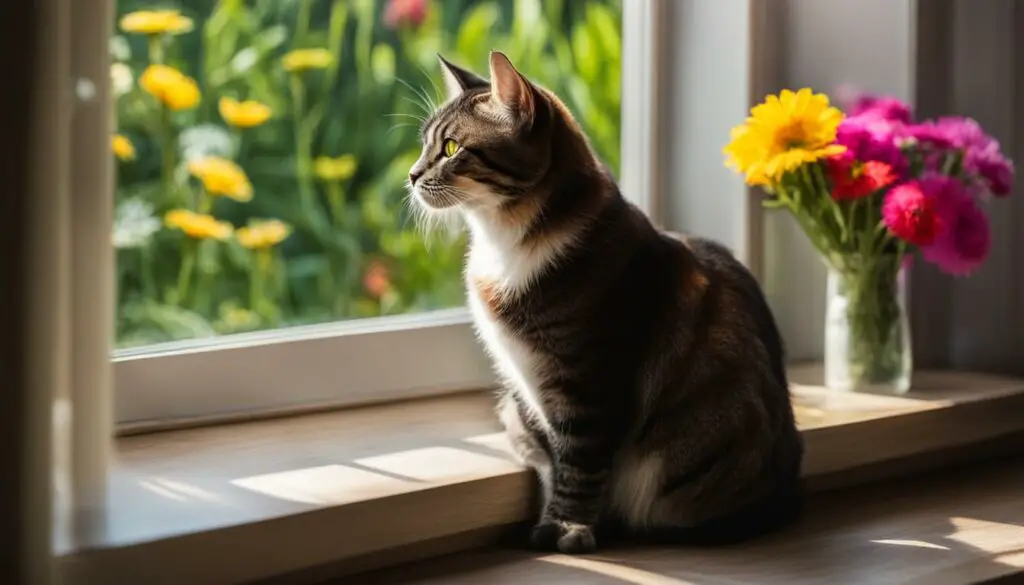
The Unique Personality of Cats
| Personality Trait | Description |
|---|---|
| Independent | Cats are known for their independent nature and their ability to entertain themselves. |
| Selective Affection | Some cats may be more selective in their affections, preferring certain individuals over others. |
| Reserved | Cats can be naturally reserved and may take time to warm up to new people or situations. |
Understanding and respecting these individual traits can help foster a stronger bond with your cat. By providing a safe and loving environment and allowing them to express their unique personality, you can create a mutually fulfilling relationship based on trust and companionship.
The Role of Early Experiences
Early experiences play a significant role in shaping a cat’s behavior and socialization. If your cat doesn’t seem to like you as much as others, it could be due to negative experiences during their critical development stage. Cats are highly sensitive animals, and any negative encounters or lack of positive interactions during this crucial period can impact their trust and comfort levels. It’s important to understand the potential influence of early experiences on your cat’s behavior.
During their early development, cats form impressions and associations that can last a lifetime. If your cat had negative encounters, such as mistreatment or scary situations, they may become wary or fearful of humans in general, including you. On the other hand, if they didn’t have positive interactions with you during this critical period, they may not have developed a strong bond or association with you.
It’s essential to remember that cats are individuals with unique personalities, and their reactions to early experiences may vary. While some cats may easily overcome negative encounters and form strong bonds with their owners, others may require more time and patience to build trust. Understanding the role of early experiences can help you empathize with your cat’s behavior and take steps to improve your bond.
| Positive Experiences | Negative Experiences |
|---|---|
| Regular playtime and interactive sessions | Physical or verbal abuse |
| Gentle handling and petting | Loud noises or traumatic events |
| Feeding and providing treats | Unpleasant or uncomfortable handling |
By gradually introducing positive experiences and interactions, you can help your cat develop trust and associate you with comfort and security. Patience, understanding, and consistency are key to building a strong bond with your feline friend.
The Importance of Positive Reinforcement
Building a strong bond with your cat requires positive reinforcement. By focusing on rewarding desirable behaviors and creating a positive environment, you can help your cat develop a preference for you rather than others.
One effective way to reinforce positive behaviors is through the use of treats. When your cat displays affectionate or friendly behavior towards you, reward them with a small treat. This positive association will help your cat associate you with pleasure and create a stronger bond.
| Positive Reinforcement Techniques | Benefits |
|---|---|
| Offer treats and praise for desired behaviors | Increases the likelihood of your cat repeating these behaviors |
| Engage in interactive playtime | Creates positive experiences and strengthens the bond between you |
| Provide a comfortable and safe environment | Enables your cat to feel secure and relaxed in your presence |
Additionally, engaging in interactive playtime with your cat is another powerful form of positive reinforcement. Use toys that stimulate their natural hunting instincts, such as wand toys or feather teasers, and actively participate in the play session. This not only provides physical exercise and mental stimulation for your cat but also helps build a positive association with you.
Lastly, creating a comfortable and safe environment for your cat is crucial. Ensure that their basic needs, such as food, water, and litter, are consistently met. Provide cozy resting spots, scratching posts, and hiding places to make them feel secure. A relaxed and stress-free environment will help your cat develop a preference for you and strengthen your bond over time.
The Role of Environmental Factors in Cat Behavior Issues
When it comes to understanding why your cat may prefer the company of others over you, it’s important to consider the role of environmental factors. Cats are highly sensitive to their surroundings, and a variety of factors within their environment can influence their behavior and level of comfort. By addressing these environmental factors, you can create a more positive and fulfilling cat-human bond.
One key environmental factor to consider is the household dynamics. Cats can be affected by changes in routine, the addition of new family members, or the presence of other pets. These changes may disrupt their sense of security and routine, leading to stress or anxiety. It’s essential to create a calm and stable environment for your cat, ensuring that they have their own safe space and opportunities for enrichment.
Another important aspect is the physical environment itself. Cats are territorial animals, and they thrive when they have access to vertical spaces, such as cat trees or shelves, where they can observe their surroundings. Providing a stimulating and enriching environment with toys, scratching posts, and hiding places can contribute to your cat’s overall well-being and help build a stronger bond with you.
| Environmental Factors | Effects on Cat Behavior |
|---|---|
| Household dynamics | Can lead to stress or anxiety in cats |
| Changes in routine | Disrupts their sense of security and stability |
| Presence of other pets | May affect territorial dynamics and cause conflicts |
| Physical environment | Access to vertical spaces and enrichment activities can contribute to overall well-being |
Creating a calm and stable environment for your cat, along with providing opportunities for enrichment, can go a long way in improving their behavior and strengthening the bond between you. Remember, cats are highly influenced by their surroundings, so ensuring a positive and stimulating environment can help them feel more comfortable and secure.
By addressing these environmental factors and making necessary adjustments to your cat’s environment, you can help alleviate any potential behavior issues and create a harmonious living space for both you and your feline friend. Remember to observe your cat’s body language and behavior cues to understand their preferences and make changes accordingly. With time, patience, and a nurturing environment, you can foster a strong and loving bond with your cat that will last a lifetime.
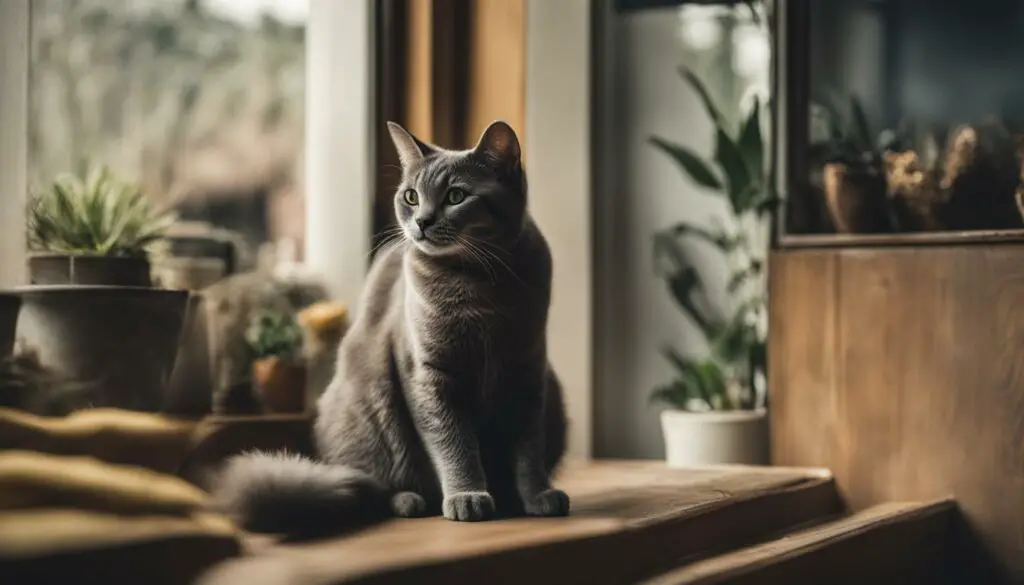
The Power of Trust and Patience
Building a strong bond with your cat takes time and patience. Cats are independent creatures with their own unique personalities and preferences. If your cat seems to prefer other people over you, it’s important not to take it personally. Instead, focus on earning their trust and gradually deepening your connection.
Respecting your cat’s boundaries is crucial. Give them space when they need it and avoid forcing interactions. Cats appreciate gentle and patient approaches. By consistently showing care, love, and respect for your cat’s individuality, you can gradually earn their trust and strengthen your bond.
Creating positive experiences is key to building trust. Use treats, praise, and playtime to associate yourself with enjoyable moments. Be consistent in your interactions and provide a safe and nurturing environment. Over time, your cat will begin to associate your presence with positive experiences, increasing their comfort level with you.
Remember, every cat is unique, and building a strong bond with your feline companion requires understanding and patience. Embrace your cat’s individuality and focus on creating a loving and nurturing relationship. Trust and patience will go a long way in fostering a strong bond between you and your cat.
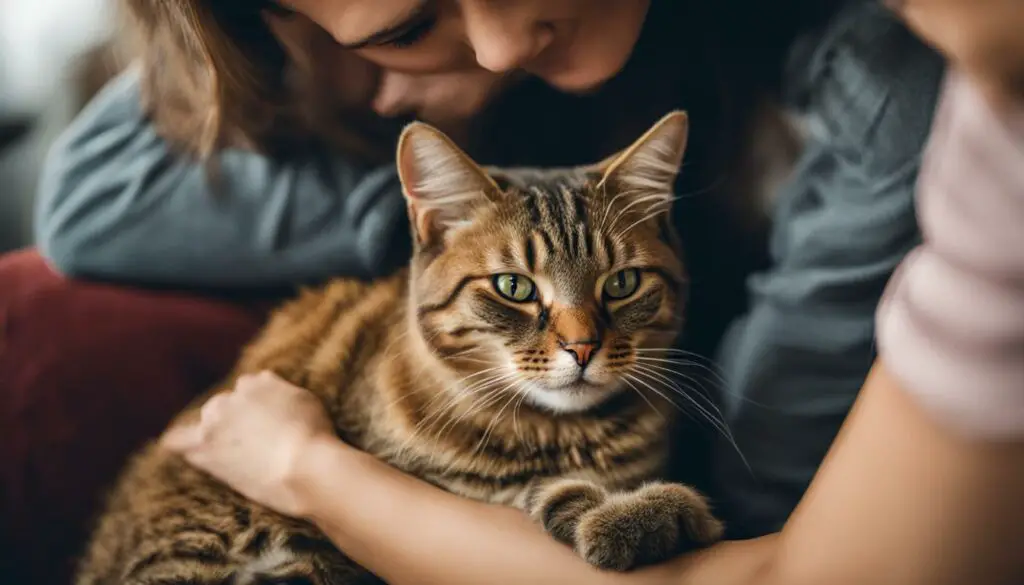
Understanding Feline Body Language
Cats are masters of communication, using subtle body language to convey their emotions and intentions. By understanding and interpreting these cues, you can gain valuable insights into your cat’s preferences and moods. Here are some key feline body language signals to look out for:
- Tail position: A relaxed, gently swaying tail indicates contentment, while a flicking or puffed-up tail may signify agitation or fear.
- Ear position: Forward-facing ears indicate attentiveness, while flattened or backward ears may suggest aggression or anxiety.
- Purring: A deep, rumbling purr often signifies relaxation and contentment, but it can also be a sign of stress or discomfort in certain situations.
- Eye contact: Direct eye contact can be a sign of trust and affection, while dilated pupils or a fixed gaze may indicate fear or aggression.
- Body posture: A relaxed, loose body posture with a slightly curved back and tail held low indicates comfort and ease. Stiff, tense body posture may suggest anxiety or readiness to attack.
By paying close attention to these body language signals, you can better understand your cat’s emotions and adjust your interactions accordingly. Remember, every cat is unique, so it’s important to consider their individual personality and past experiences when interpreting their body language.
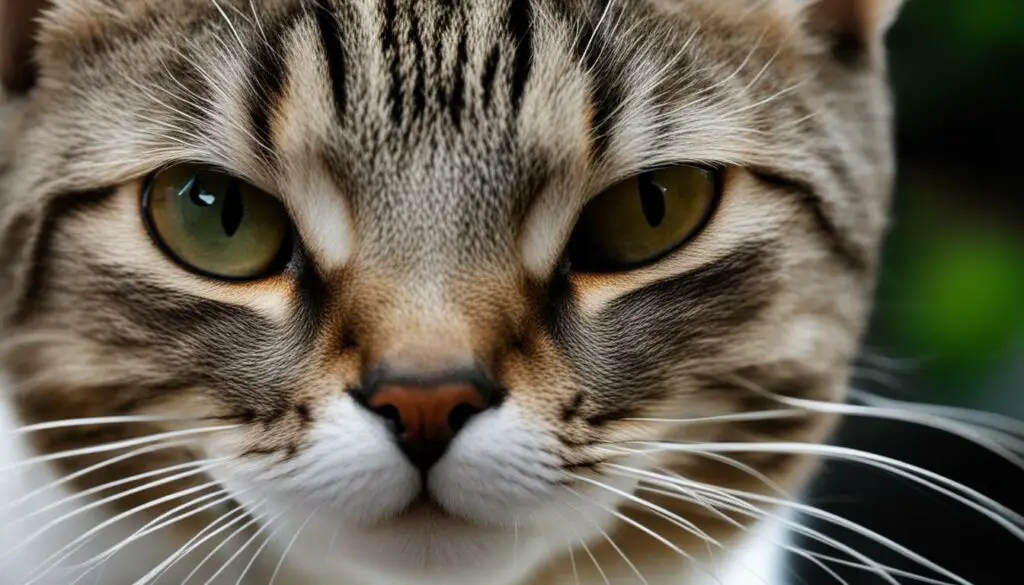
Creating a Positive and Comfortable Environment
In order to foster a strong cat-human bond, it’s crucial to provide a positive and comfortable environment for your feline companion. Here are some tips to create an environment that promotes trust and bonding:
- Safe spaces: Ensure that your cat has access to quiet, cozy areas where they can retreat and feel secure.
- Consistency: Cats thrive on routine, so try to establish a predictable schedule for feeding, playtime, and other activities.
- Enrichment: Provide plenty of toys, scratching posts, and interactive play sessions to keep your cat mentally stimulated and physically active.
- Respect boundaries: Cats appreciate having their personal space respected. Avoid forcing interactions and allow your cat to approach you on their terms.
- Positive reinforcement: Reward desirable behaviors with treats, praise, and affection to reinforce the bond between you and your cat.
By creating a safe, stimulating, and nurturing environment, you can help your cat feel loved, secure, and more inclined to form a strong bond with you.
The Importance of Seeking Professional Guidance for Cat Behavior Issues
If your cat’s dislike towards you persists despite your efforts to improve your relationship, it may be beneficial to seek professional guidance from a veterinarian or animal behaviorist. These experts have extensive knowledge and experience in understanding feline behavior patterns and can provide tailored advice and strategies to address any underlying issues contributing to your cat’s preference for other individuals.
Professional guidance can help you identify and address any potential physical or psychological factors that may be influencing your cat’s behavior. A veterinarian can conduct a thorough examination to rule out any medical conditions that could be causing discomfort or pain, which may impact your cat’s interactions with you. An animal behaviorist can assess your cat’s behavior and provide insights into past experiences, environmental factors, and potential socialization issues that may be contributing to their behavior.
“Seeking professional guidance can help you understand your cat’s behavior more deeply and provide you with effective strategies to strengthen your bond with your feline companion.”
Remember, every cat is unique, and there is no one-size-fits-all solution for cat behavior issues. Professional guidance can provide you with a customized approach that takes into account your cat’s individual needs, preferences, and background. With their expertise, you can gain a deeper understanding of your cat’s behavior and develop a plan that focuses on creating a positive and fulfilling relationship between you and your feline friend.
When to Seek Professional Guidance
While some cat behavior issues can be addressed through simple adjustments and environmental changes, there are certain situations where seeking professional guidance is highly recommended:
- If your cat’s dislike towards you is accompanied by aggressive behavior, such as biting or scratching.
- If your cat is excessively fearful or anxious, leading to avoidance behaviors or hiding.
- If your cat’s behavior is causing significant stress or disruption to your household.
- If your attempts to improve your cat’s behavior have been unsuccessful.
By recognizing when to seek professional help, you can take proactive steps towards resolving cat behavior issues and fostering a stronger connection with your beloved feline companion.
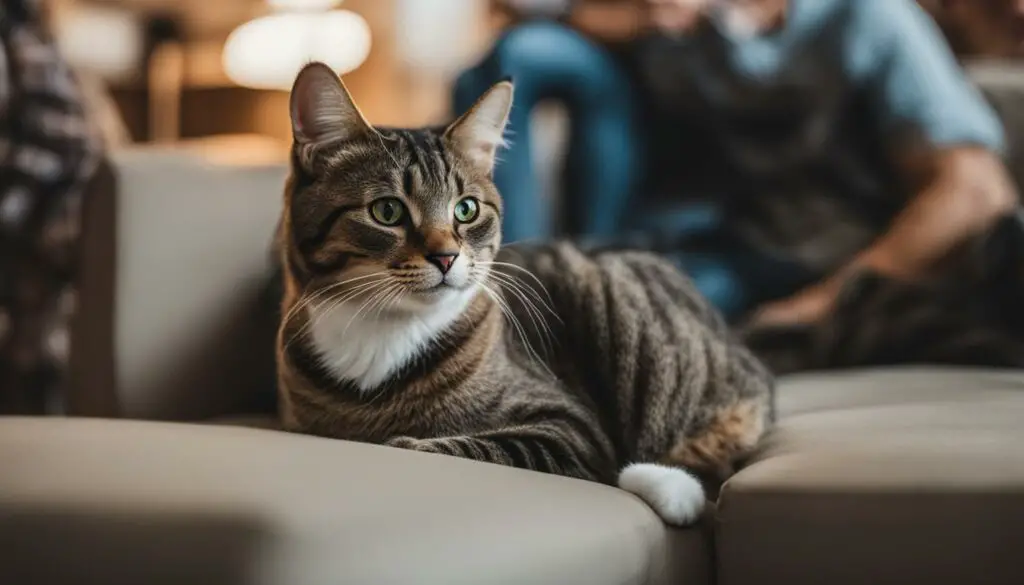
Cats and Their Unique Bonds
Building a strong bond with your cat is a special and rewarding experience. Each cat-human relationship is unique, shaped by factors such as their individual personalities, past experiences, and instincts. Understanding feline behavior patterns can help foster a deeper connection with your furry friend.
The Cat-Human Bond
The bond between a cat and their owner is based on trust, love, and mutual understanding. Cats are instinctively independent creatures, but they still form close attachments with the humans who care for them. Taking the time to develop a strong bond can lead to a happier and more fulfilling relationship.
The cat-human bond can be strengthened through various activities and interactions. Spending quality time together, such as playing games or grooming your cat, can create positive experiences and build trust. Providing a safe and comfortable environment, along with regular feeding and care, also helps solidify the bond between cat and owner.
| Ways to Strengthen the Bond | Benefits of a Strong Bond |
|---|---|
| Regular playtime and interaction | Increased trust and affection from your cat |
| Gentle and positive handling | Reduced stress and anxiety for your cat |
| Creating a safe and comfortable environment | A deeper understanding of your cat’s needs and behaviors |
Remember, building a strong bond with your cat takes time, patience, and understanding. Every cat is unique, and it’s important to respect their individual preferences and boundaries. By nurturing your cat-human bond, you can enjoy a lifelong companionship filled with love and affection.
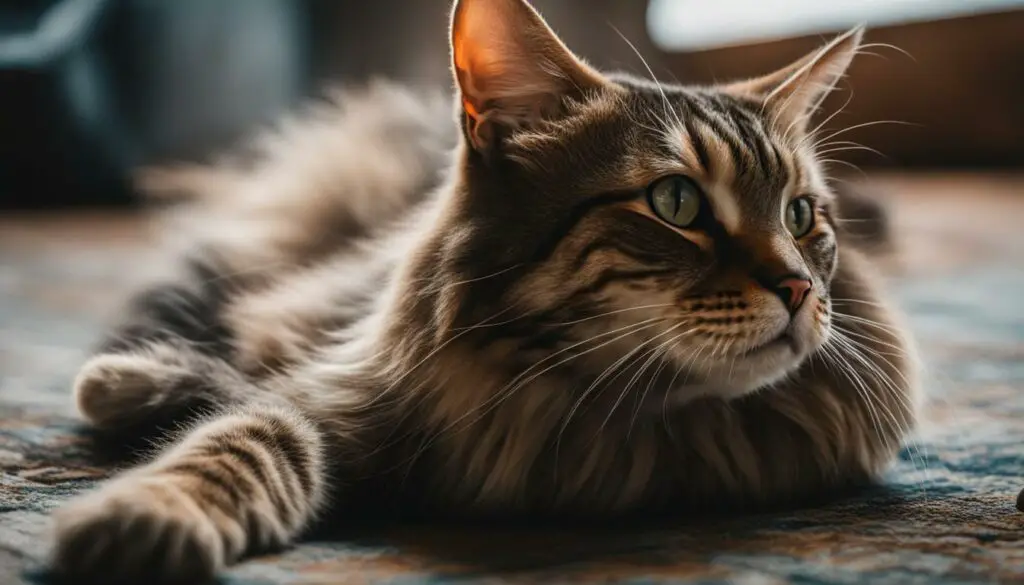
The Importance of Love and Acceptance
Creating a strong bond with your cat is all about love and acceptance. Cats are unique creatures with their own individual personalities and preferences. It’s important to provide them with a safe and loving environment where they feel secure and valued. By showering your cat with unconditional love, you can build a foundation of trust and create a deep and meaningful relationship.
Acceptance is another key factor in developing a strong bond with your cat. Cats have their own quirks and behaviors, and it’s important to embrace and appreciate their individuality. Whether your cat is reserved or outgoing, affectionate or independent, accepting them for who they are will strengthen your connection. Remember, it’s not about changing your cat’s personality, but rather understanding and respecting their unique traits.
“A cat’s love cannot be forced or demanded. It must be earned through patience, respect, and understanding.” – Anonymous
Patience is essential when it comes to building a bond with your cat. Some cats may take longer to warm up to their owners, while others may be more quick to trust. Give your cat the time and space they need to feel comfortable with you. Avoid forcing interactions or expecting immediate affection. Instead, focus on creating positive experiences by offering treats, playing gently, and providing a calm and soothing environment.
The Power of Mutual Companionship
When you truly connect with your cat on a deep level, you’ll experience the joy of mutual companionship. Your cat will seek out your company and enjoy spending quality time with you. This is a testament to the bond you’ve formed based on love, acceptance, and understanding. Treasure these moments and continue to nurture your relationship for a lifetime of happiness together.
| Benefits of Love and Acceptance in the Cat-Human Bond | How to Cultivate Love and Acceptance |
|---|---|
| Creates a sense of security for your cat | Show unconditional love and affection |
| Strengthens the bond between you and your cat | Respect your cat’s individuality |
| Improves your cat’s overall well-being | Be patient and understanding |
Conclusion
Building a strong bond with your cat is a journey that requires love, acceptance, and patience. By providing a nurturing and accepting environment, you can create a deep and meaningful connection with your feline companion. Remember, each cat is unique, and it’s important to embrace and appreciate their individuality. Through love and acceptance, you can forge a lifelong bond filled with joy, companionship, and mutual understanding.
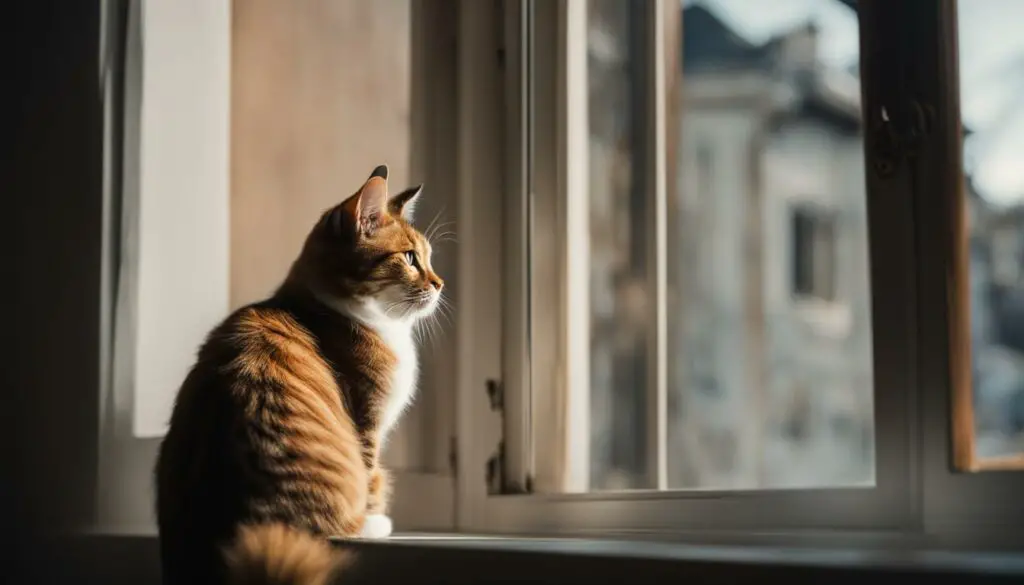
Embracing the Uniqueness of Your Cat’s Affections
It can be disheartening when your cat seems to prefer the company of others over you. However, it’s important to remember that every cat is unique and has their own preferences and quirks. Rather than feeling discouraged, embrace the uniqueness of your cat’s affections and focus on cultivating a loving and fulfilling relationship based on mutual respect and understanding.
Just like humans, cats have different personalities and may naturally gravitate towards certain individuals. Whether it’s due to compatibility or shared experiences, it’s important not to take it personally if your cat seems to prefer someone else. Instead, create an environment where your cat feels secure, loved, and valued for who they are. Shower them with affection, provide stimulating toys and activities, and ensure they have a cozy and comfortable space to call their own.
Building a strong bond with your cat takes time and patience. Avoid forcing interactions and respect their boundaries. Allow your cat to approach you on their terms and provide them with space when needed. By consistently showing care, love, and respect for your cat’s individual personality, you can gradually earn their trust and deepen your bond. Remember, it’s not about competing for their affection, but about building a relationship based on mutual trust and companionship.
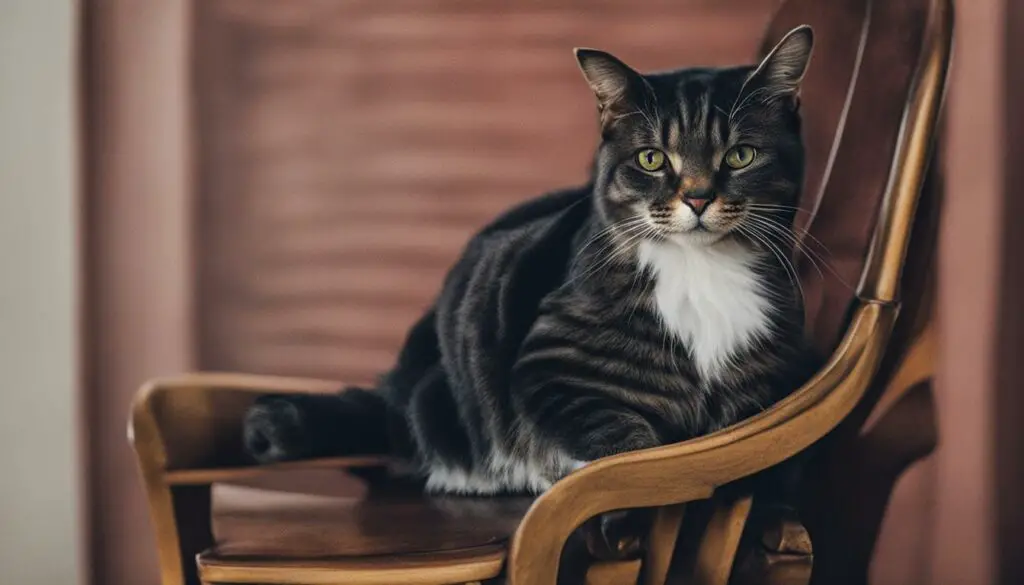
In summary, instead of focusing on why your cat may prefer others, embrace the uniqueness of their affections. Understand that each cat is an individual with their own preferences and quirks. Create a loving and nurturing environment, respect their boundaries, and be patient as you build a strong bond. By doing so, you can create a mutually fulfilling relationship with your feline companion, based on love, trust, and understanding.
Nurturing Your Relationship Over Time
Building a strong bond with your cat takes time, patience, and consistent effort. While it can be disheartening if your cat seems to prefer others over you, it’s important to remember that relationships with cats are unique and complex. By understanding their behavior, providing a positive environment, and respecting their individual preferences, you can nurture your relationship and foster a deep connection with your feline companion.
Creating a Positive Environment
A crucial aspect of nurturing your relationship with your cat is creating a positive and nurturing environment. Ensure that your cat has access to clean litter boxes, fresh water, and a comfortable resting place. Provide enriching toys and opportunities for playtime to keep them mentally and physically stimulated. Establish a routine that offers stability and predictability, as cats thrive in a structured environment.
Respecting Individual Preferences
Just like humans, cats have unique personalities and preferences. Respect your cat’s need for personal space and allow them to approach you when they feel comfortable. Avoid forcing interactions or overwhelming them with attention. Instead, observe and learn their body language cues to better understand their mood and boundaries. By respecting their individuality, you can build trust and create a safe space for your cat to express their affection naturally.
Consistency and Patience
Building a strong bond with a cat takes time and patience. Consistency in your actions and interactions is key. Stick to a regular feeding and playtime schedule, and provide them with love and attention every day. Be patient and understanding as your cat may have had previous experiences that influence their behavior. By consistently showing them love, care, and respect, you can gradually strengthen your bond and develop a deep and meaningful relationship.
Remember, each cat is unique, and their preferences may change over time. By providing a positive environment, respecting their individuality, and being consistent and patient, you can nurture your relationship and create a loving connection with your cat. Enjoy the journey of building a bond with your feline companion and cherish the moments of love and affection you share.
Conclusion
Building a strong and loving bond with my cat has been a journey filled with patience, understanding, and adaptability. While some cats may not show the same affection towards their owners, it’s important to remember that each cat is unique, with their own preferences and behaviors.
Throughout this process, I have learned to embrace the uniqueness of my cat’s affections and focus on cultivating a relationship based on mutual love and acceptance. By creating a safe and nurturing environment, providing positive reinforcement, and respecting my cat’s boundaries, I have been able to strengthen our bond and overcome any initial challenges.
However, I understand that some cat behavior issues may require professional guidance. If my cat’s dislike towards me persists despite my efforts, I would not hesitate to seek the advice of a veterinarian or animal behaviorist. Their expertise can help identify any underlying issues and provide tailored strategies to address them.
In the end, the cat-human bond is a precious and unique connection. By investing time and effort into understanding my cat’s individual needs, I have been able to create a loving and fulfilling relationship. With continued patience and care, I look forward to nurturing our bond and cherishing the special moments we share.
FAQ
Why does my cat not like me but likes everyone else?
Cats have their own unique personalities and preferences, which can greatly influence their interactions with humans. Some cats may naturally be more reserved or selective in their affections, which may contribute to them seeming to prefer other people over their owners.
How does a cat’s unique personality affect their behavior towards humans?
Cats are known for being independent and aloof compared to dogs. Their individual personalities and preferences can greatly influence their interactions with humans and their affections towards different individuals.
Can early experiences impact a cat’s behavior towards specific people?
Yes, early experiences play a significant role in a cat’s behavior and socialization. Negative experiences during their critical development stage can affect their trust and comfort levels towards certain individuals.
How can positive reinforcement improve my relationship with my cat?
Cats respond to positive reinforcement. By creating a positive and nurturing environment, using treats, praise, and playtime, you can strengthen the bond between you and your cat.
What environmental factors can influence a cat’s preference for certain people?
Cats can be influenced by factors such as household dynamics, changes in routine, or the presence of other pets. These factors can impact a cat’s comfort level and their feelings towards specific individuals.
How can I build trust with my cat?
Building trust with a cat takes time and patience. It’s important to respect their boundaries, provide them with space when needed, and consistently show care, love, and respect for their individual personality.
How can I understand my cat’s emotions through their body language?
Cats communicate their emotions and intentions through subtle body language cues. By learning to interpret their body language, you can better understand their preferences and moods and adjust your approach accordingly.
What should I do if my cat’s dislike towards me persists?
If your efforts to improve your relationship with your cat are not successful, it may be beneficial to seek professional guidance from a veterinarian or animal behaviorist who can assess your cat’s behavior and provide tailored advice and strategies.
Why do cats form unique bonds with different individuals?
Cats form complex relationships and affinities based on their instincts, past experiences, and individual preferences. They may naturally gravitate towards certain individuals due to compatibility or shared experiences.
How important is love and acceptance in building a bond with my cat?
Cats thrive in an environment where they feel secure, loved, and valued for who they are. By providing unconditional love and acceptance, you can create a foundation for a deep and satisfying relationship with your feline companion.
How can I embrace the uniqueness of my cat’s affections?
It’s important to appreciate and embrace your cat’s individuality. Every cat is unique, and their affections may differ from yours or other individuals’. Focus on cultivating a loving and fulfilling relationship based on mutual respect and understanding.
How can I nurture my relationship with my cat over time?
Building a strong bond with your cat takes time and effort. Continually nurture your relationship by providing a safe, stimulating, and loving environment that allows for mutual trust and companionship.
Source Links
- https://www.metafilter.com/200924/What-exactly-makes-someone-a-dog-person
- https://www.lauriestonewrites.com/2019/04/04/6-reasons-not-to-get-another-catsniff/
- https://www.askamanager.org/2023/09/coworker-wants-me-to-lock-up-my-dogs-so-he-can-come-to-parties-at-my-house-explaining-a-medical-accommodation-and-more.html

